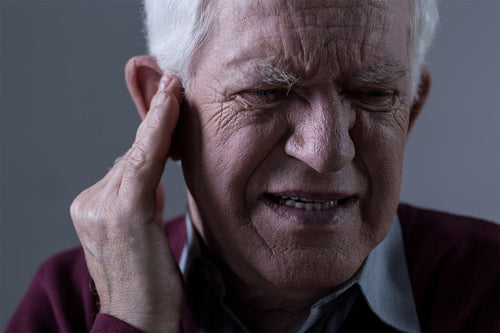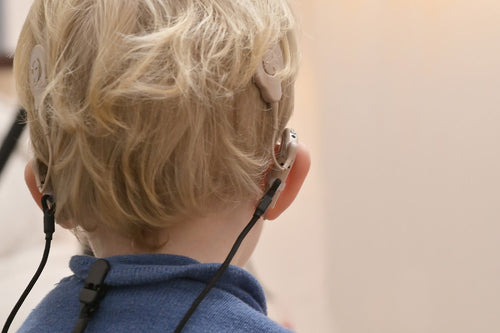Hearing loss tends to come to mind when people think of hearing conditions, but there are many other hearing conditions out there. While those with hearing loss have a decreased sensitivity to sound, there are hearing conditions that exist that can increase your sensitivity to noise.
Having more sensitive hearing may not sound like a bad thing, but it can cause individuals to find typical everyday sounds irritating or even intolerable. Below is a closer look at some conditions that involve an increased sensitivity to noise and a dive into their potential causes.
Sound sensitivity can be difficult to deal with. Understanding the underlying reasons as to why they are sensitive can give you some valuable insight.
Sound Sensitivity Conditions

Every person perceives the world slightly differently, and this includes the way in which you perceive sounds. Every person has a slightly different idea of what a loud sound is and is not. While there is variation in the perception of what is loud, there is a pretty large agreement on sounds that occur at a normal sound level.
Everybody is likely to react poorly to loud sounds, and hearing sensitivity disorders deal with individuals that perceive sounds at a reasonable sound level as loud or unbearable.
Here is a closer look at three sound sensitivity disorders and what they encompass:
Misophonia
Misophonia is a sound sensitivity that causes individuals to have a hypersensitivity to specific sounds. Misophonia is considered more of a psychological condition than a hearing condition because it is, in essence, an aversion to a specific sound. The reaction to the aversive sounds tends to be emotionally charged and causes them to feel anxious or angry.
Even though misophonia is more psychological in nature, the reaction to certain sounds can have negative effects on your overall well-being. Some sounds that people with misophonia may have an aversion to include slurping, chewing, breathing, and even the clinking of dishes.
If left untreated, misophonia can cause a number of potential problems — one of those includes avoidance and self-isolation. Getting treatment for this reason alone can help give individuals a better ability to retain their social wellbeing and the ability to go outside without feeling anxious.
Hyperacusis
Hyperacusis is another hearing sensitivity disorder. But rather than focusing on specific sounds, hyperacusis is a sensitivity to the loudness of sound. Essentially a sound like ice cubes clinking in a cup is perceived as unbearable too loud even though other people perceive the sound at a normal volume.
Hyperacusis tends to be thought of as a condition that is between both physiological and psychological conditions. On the one hand, damage to the ear can cause increased sensitivity to sound, while on the other hand, the brain can start interpreting normal sounds as loud sounds leading to sensitivity.
Hyperacusis tends to have a severe impact on an individual's quality of life. Simple tasks like going outside on a walk could be a miserable experience due to normal sounds sounding way too loud.
Because hyperacusis is a general sound sensitivity, it can be difficult to avoid. Many people with hyperacusis wear earplugs or earmuffs to help reduce the volume of sounds to a point where they are no longer bothersome.
Tinnitus
Tinnitus is a hearing sensitivity disorder that causes individuals to hear not present or perceivable sounds to others. Typically those with tinnitus hear a sound such as a single tone that doesn't go away.
The exact sound you may hear with tinnitus can vary quite a bit from person to person, but they tend to be described to sound like a high-pitched tone, a tea kettle whistle, static noise, or even like a whooshing.
What Are Common Causes of Noise Sensitivity?
Tinnitus, hyperacusis, and misophonia may seem like completely different conditions, but they do have a number of similar potential causes. Below is a closer look at some of the most common causes of sound sensitivity as well as conditions that are linked in some way to sound sensitivity.
Injury
A physical injury to the head is one potential cause of both tinnitus and hyperacusis. Injuries to the head can impact your ability to hear as the brain is the center of auditory perception. Your ears are great at helping convert sound waves into neural signals, but ultimately you can’t hear without the brain.
When it becomes injured and heals, it could alter your perception of sounds and result in a phantom ringing like tinnitus or increased sensitivity to the noise level of sounds.
Additionally, head injuries (specifically those impacting the inner ear) could cause increased sensitivity to noise. The inner ear serves an important function in your ability to hear. If it becomes injured, it can alter your perception of sound and could cause hypersensitivity to noise or cause tinnitus.
Hearing Loss
Hearing loss is characterized as a decreased ability to hear sound. While on the surface, this may seem like the exact opposite of sound sensitivity, they are actually connected. When you begin to lose your hearing, it is thought that your brain tries to adapt to this change by figuratively turning up the volume and increasing the sensitivity of signals coming from the ears.
This increase in sensitivity is thought to potentially cause the interpretation of sound in the absence of a signal causing tinnitus as well as an amplification of incoming sounds, which could lead to hyperacusis.
Loud Noise Exposure
The ears are incredibly well suited to hear many different sounds in your environment, but they also have their limitations. When it comes to loud noise exposure, the ears can become damaged. This can contribute to hearing loss in addition to sensitivity disorders like tinnitus and hyperacusis.
So, exactly how many decibels is too loud?
Sounds that are above 70 dB in loudness have the ability to cause damage to the ears over extended periods of time. The higher the noise level, the less exposure time is needed for it to begin causing damage to your hearing. Sounds like an air horn at close range can be loud enough to actually cause near-immediate damage to the ear.
Other Psychological Disorders
As discussed previously, misophonia is a noise sensitivity to only specific sounds such as slurping or chewing. Misophonia in this way is more of a psychological condition. While not a direct cause, there are some psychological problems that seem to occasionally occur alongside misophonia. This includes OCD, mood disorders, and ADHD.
What Can Be Done?

At the end of the day, if you have sensitive ears, you most likely are looking for some level of relief. There are a number of things that people try in an effort to help, including utilizing earplugs. Note that while earplugs may help to shield noises from entering your ears, they have the potential to promote further increases in hearing sensitivity.
For most of those with tinnitus, hyperacusis, or misophonia, there is no form of immediate cure, but treatments are available that can help. Below is a closer look at the treatment options available for hearing sensitivity disorders and what they entail.
Cognitive Behavioral Therapy
When it comes to sound sensitivities, there is a tricky interplay between what you are sensing and your perception of that sensation. If you take misophonia as an example, your ear detects the sound of someone chewing. Then, the brain interprets that sound as something bad or disgusting.
Cognitive Behavioral Therapy focuses on changing the perception of the sound to one that is neutral or less severe. This same concept applies to both tinnitus and hyperacusis as well.
Desensitization
Desensitization is a treatment that utilizes progressively more and more sound to try and desensitize a sensitivity to sound. An example would be hyperacusis, where a sound generating device may be worn that emits sounds that are mildly irritating. After some time, the volume increases and continues over a long time until the hearing is restored to normal.
Hearing Aids
Hearing aids are another treatment that can help with hearing sensitivity. Hearing loss may be a contributing factor to some hearing sensitivities; getting hearing aids could potentially help. Hearing aids can help with sensitivities like those experienced by tinnitus by drowning out the sounds of tinnitus.
Sensitive Sense
There are many reasons you may be sensitive to noise. This can include conditions like hyperacusis, tinnitus, or misophonia. While these represent the main hearing sensitivity disorders, your specific sensitivity may be caused by something else.
If you experience sensitivity to noise, you should see your audiologist for a thorough hearing exam to find the specific cause of your sensitivity.
Sources
Misophonia: Phenomenology, comorbidity and demographics in a large sample
Tinnitus: Ringing in the ears and what to do about it |Harvard Health




